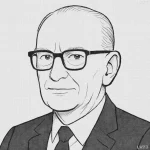“The greatest tragedy in mankind’s entire history may be the hijacking of morality by religion.”

- December 16, 1917 – March 19, 2008
- British
- Science Fiction Writer, Futurist, Inventor, Author of 2001: A Space Odyssey
table of contents
Quote
“The greatest tragedy in mankind’s entire history may be the hijacking of morality by religion.”
Explanation
In this quote, Arthur C. Clarke presents a provocative critique of the historical entanglement between religion and ethics, suggesting that morality, which can stand on its own as a humanistic and rational endeavor, has often been co-opted or constrained by religious dogma. His use of the word “hijacking” implies that morality has been diverted from its natural course, made to serve systems of belief that sometimes promote intolerance, division, or blind obedience.
Clarke, a lifelong advocate of rationalism and secular ethics, believed that morality should be based on empathy, reason, and shared human values, rather than religious authority. He viewed religion’s influence as often limiting moral growth, especially when doctrines resisted social progress or justified violence. His comment reflects a broader modern critique that morality predates religion, and that human beings are capable of ethical behavior without supernatural incentives or threats.
Today, Clarke’s quote continues to resonate in discussions about secularism, pluralism, and the role of religion in politics and education. While many find moral guidance in faith, Clarke’s perspective champions a universal ethics independent of theology, one that seeks to unite rather than divide. It urges us to reclaim moral discourse from institutions that may distort it, and to ground our ethics in compassion, logic, and shared humanity.
Would you like to share your impressions or related stories about this quote in the comments section?

